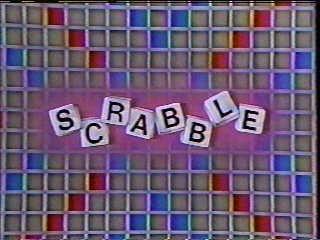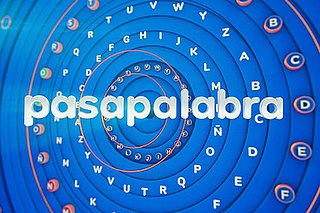Competition rounds
Two teams of two people were taken from the "Player's Paddock" (an enclosure containing enough fresh players to enable the producers to make five programmes in one studio session). They were shown a "lucky ladder"—a chain of seven words that connect to each other in some way. The top and bottom words were revealed at the outset, and the contestants would have to try to guess what words belonged in-between, one letter at a time.
The contestants in play would be offered the choice to "give a letter" (a tactical move that would reveal the next letter to the opposing team in the hope that they wouldn't be able to guess the word correctly) or "guess a letter" (generally a safer bet, ensuring that the team remained in play, provided they didn't get the word wrong.) A wrong guess or taking too long would make it the opposing team's turn. No conferring between players on the same team was allowed. After each round the players would switch roles.
10 points were awarded per correct word guessed, with 20 points for the final word to complete the ladder. At each game's completion, Bennett explained the connections for the benefit of any viewers in the audience or at home who may not have understood the connections. The points were then increased to 20/40. If the game was not won at this point, the points could be increased to 30/60 or 40/80.
Jackpot round
The first team to 200 points won the game, and were invited to complete a "jackpot ladder", which took exactly the same format as the main game but without the bottom word being revealed at the outset, but the first letter of each word below the previous word would be revealed. The players were only allowed five free letter clues instead of the unlimited supply they had in the main game. Any teams who completed five jackpot ladders were retired from the game, usually with a big prize.
Prizes
The entire show was made cheaply and en masse in order to fill a weekday half-hour slot, and the prizes were not generally of a great equivalent cash value. All winning contestants received a Lucky Ladders trophy. Lennie Bennett revealed in Yorkshire Television's One Day in the Life of Television (1 November 1989) that only six of these trophies were made for promotional purposes, and that players were required to hand them back after recording. Defeated newcomers would receive Lucky Ladders watches. Defeated champions would win a greater prize depending on how many "prize ladders" they completed.

Eye Guess was an American game show created by Bob Stewart and hosted by Bill Cullen, which aired on NBC from January 3, 1966, to September 26, 1969. The game combined a general knowledge quiz with a Concentration-style memory element, where the answers were shown to the players and their recall of their positions was tested.

Scrabble is an American television game show based upon the board game Scrabble. Contestants competed in a series of rounds to fill in words within a crossword puzzle for cash. Muriel Green of Exposure Unlimited developed the idea for a television game show based upon the board game concept. During 1983, Green convinced Selchow and Righter, who at that time owned the Scrabble board game, to license Exposure Unlimited to produce the game show. Exposure Unlimited co-produced the show with Reg Grundy Productions, and licensed the show to NBC. Scrabble aired on NBC from July 2, 1984, to March 23, 1990, and again from January 18 to June 11, 1993. Chuck Woolery hosted the program. Jay Stewart was the announcer for the first year. Charlie Tuna replaced him in the mid-1985 and remained through the original run and the entirety of the 1993 revival.

Lingo is an American television game show with multiple international adaptations. Contestants compete to decode five-letter words given the first letter, similarly to Jotto, with each correctly guessed word earning number draws to attempt filling in a Bingo card.

Now You See It is an American television game show created by Frank Wayne for Mark Goodson-Bill Todman Productions. The object of Now You See It is to answer general knowledge trivia questions by finding the answers hidden in a grid, similar to a word search puzzle.

Chain Reaction is an American television game show created by Bob Stewart, in which players compete to form chains composed of two-word phrases.
BrainTeaser was a British game show based on the original Dutch format of Puzzeltijd. The show was broadcast live, with phone-in viewer puzzles being announced and played during the show in addition to the studio game. During its run from 5 August 2002 to 7 March 2007, it aired on Five Mondays to Fridays, usually for an hour around lunchtime, and was fronted by various presenters rotating with one another. Beginning in August 2005, a version of the show that exclusively focused on viewer participation was broadcast in a four-hour long block on YooPlay TV every day after the Five broadcast, as part of a thirteen-week trial.

Game Ka Na Ba?, formerly Pilipinas Game Ka Na Ba is a Philippine game show created by ABS-CBN Studios. The main goal of the game is to win 2 million pesos by answering trivia questions.

All-Star Blitz is an American game show that aired on ABC from April 8 to December 20, 1985, with reruns airing on the USA Network from March 31 to December 26, 1986. Peter Marshall was the host and John Harlan was the announcer for the series, which was produced by Merrill Heatter Productions, in association with Peter Marshall Enterprises.
The Last Word is a game show seen in syndication in the United States and on the Global Television Network in Canada that was produced by Merrill Heatter Productions and ran for 65 episodes from September 18 to December 15, 1989, with reruns continuing until January 5, 1990. The host was Wink Martindale, and the co-host/announcer was Jennifer Lyall. It was taped in Vancouver, British Columbia. In the Los Angeles-produced pilot, Burton Richardson was the announcer, and Jana White operated the computer and acted as co-host. The show was distributed by Turner Program Services.
PDQ and Baffle are American television game shows created by Heatter-Quigley Productions. Both shows' objective was for contestant/celebrity teams to guess a given word or phrase in the shortest amount of time with the fewest letters given as possible.
The (£1,000) Pyramid Game is a United Kingdom game show based on the American format of the same name that was originally shown on ITV from 1981 to 1984 then 1989 to 1990 hosted by Steve Jones, then revived by Challenge in 2007 hosted by Donny Osmond.
Wordplay is a game show presented by Jenny Powell and sometimes Jenni Falconer. It aired live weekdays from 23 March to 31 July 2009 on Channel 5 and was axed after only one series.

Lingo is a television game show that aired in the Netherlands between 1989 and 2014, and returned in 2019 on the commercial channel SBS6. Since 2022, it is aired on the commercial channel Net5. The format consists of a word game that combines Mastermind and Bingo.
Action Réaction is a French Canadian game show, an adaptation of the American game show Chain Reaction, in which players compete to form chains composed of two-word phrases. It aired on TQS from 1986 to 1990, with Pierre Lalonde as host, and was taped on the same set as the then-concurrent Global/USA Network version.
Family Game Night is an American television game show based on Hasbro's family of board games and EA's video game franchise of the same name. The show was hosted by Todd Newton. Burton Richardson was the announcer for the first two seasons; he was replaced by Stacey J. Aswad in the third season, and Andrew Kishino was hired for the fourth season. The 60-minute program debuted on October 10, 2010, on The Hub ; it was previewed on October 9, 2010, on its sister channel, TLC. Seasons 1 and 2 contained 26 and 30 episodes respectively. Seasons 3, 4 and 5 each contained 15 episodes. Season 2 premiered on Friday, September 2, 2011, with additional games being added. The games added to the second season included Cranium Brain Breaks, Green Scream, Ratuki Go-Round, Simon Flash, Operation Sam Dunk, Trouble Pop Quiz, and Spelling Bee. However games from the previous season were still kept.
Spellbound is a British game show that aired on Sky One from 3 October 1994 to 30 August 1996. It was hosted by Paul Coia.
L'eredità is an Italian Rai 1 game show currently hosted by Marco Liorni. It premiered on 29 July 2002. From 29 July 2002 to 10 June 2006, it was hosted by Italian presenter Amadeus. He was succeeded by Carlo Conti, who hosted the show until 14 April 2014, when he was replaced by Fabrizio Frizzi. Frizzi hosted until 23 October 2017, when he became ill during the taping of the next show and was taken to the hospital. Carlo Conti substituted for Frizzi from 30 October 2017 to 15 December 2017, and he hosted the special episode in tandem with Fabrizio Frizzi when the latter returned to host the quiz. On 16 December 2017, Fabrizio Frizzi resumed hosting the show by himself until 25 March 2018. The next day, Frizzi died of a brain haemorrhage. Following a hiatus due to Frizzi's death, the game returned from 3 April 2018 until the end of the season with the host Carlo Conti. Flavio Insinna presented the show from 24 September 2018 until 2023.

Pasapalabra is a Spanish television game show, adapted from the British format The Alphabet Game. The title is a portmanteau of the Spanish verb pasar, "pass", and palabra, literally "word".

People Puzzler is an American television game show hosted by Leah Remini and broadcast by Game Show Network. It premiered on January 18, 2021. The show is inspired by the celebrity and pop-culture themed crosswords in People magazine.










